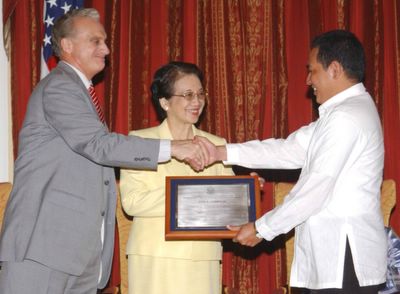Remarks by Jose Torres Jr. after receiving the 2005 Benigno S. Aquino, Jr. Fellowship for Professional Development given by the Embassy of the United States of AmericaFebruary 16, 2005
Ambassador Ricciardone, Madame President Aquino, colleagues and friends.
Being a journalist is the best award I achieved in my life. Working as a journalist is a privilege I enjoy. I never expected that doing things I really love merits an award.
I was born in a place where people love to tell stories. I came from a place where stories and dreams are the only things most people enjoy for free. I came from a place where real-life stories are truly stranger than fiction.
I grew up in Mindanao where stories about religious groups doing bizarre rituals were as real as stories about elections and governance.
I just came back from a place in Mindanao yesterday where a town mayor officiated the wedding of more than a hundred couples while hundreds of people were marching around town, carrying the coffin of the witness of a journalist’s murder.
I came back from a town where I listened, for almost two hours, to a killer brag about how easy it is to end the life of another human being. He was proud to tell me how he and his town mates were able to support the local economy by working as guns-for-hire.
I came back from Mindanao where I once more feasted on the vastness of its seas, the greenness of its forests and the possibility of discovering mysteries and stories that seemed to forever hide behind the shadow of its mountains.
I believe in a journalism that simply tells the stories of people’s lives. I believe in a journalism that does not make celebrities out of journalists. I believe in a journalism that contributes to understanding, not conflict.
There’s no lack for stories that make this kind of journalism. For instance, a priest in a town in Basilan hates to talk about Muslim-Christian dialogue, but invites his Muslim friends to the convent for a feast. “I just promised them that I do not prepare pork,” he said.
I just love to tell stories. That’s why I once dreamt of becoming a journalist. I did not know then that I was supposed to be responsible. I did not care then what would happen to the “subjects” of my stories. Why should I care? I did not even care then what would happen to me after I write the stories.
The realization that doing good journalism, writing stories of people’s lives – be they mighty or serf, terrorist or priest – describing their plight, made me feel that I am just one of them – a citizen and a storyteller. It led me to discover later that I also have a responsibility to be part of the struggle to defend the rule of law, human rights and the search for truth.
Working as a journalist made me realize how difficult it is to live in peace. Politicians interpret the law according to their own designs, interest groups try to create their reasons for existence by inventing tales of good and evil, and journalists, who love to be always in the middle of everything, often imbibe the character of both politicians and interest groups.
“We are making extremely difficult the simple fact of living together as human beings,” one journalist once remarked. It is true. But I also believe it is also extremely simple for us to make the fact of living together as human beings simple.
Journalists need not commit to any cause or belief or advocacy to contribute to changing the face of the earth. We only need to commit ourselves to truth and honesty. My only hope is not to forget to continue the struggle to remember it. Journalism is a state of mind, a lifetime task of storytelling.
By the way, I am excited to go to the United States. I was born and raised in a place surrounded by seas and mountains. I thought then that there’s nothing beyond it. I was wrong. The other side of the mountain has its own stories. I hope to listen to the story of America on the other side of the world.
It is an honor to receive this award. I thank the people who made this happen – my mentors, my inspirations and my friends. I accept this award on behalf of all the people whose stories helped me journey to where I am today.
Thank you.


